Falcons fans have defaulted on payments for thousands of personal seat licenses since Mercedes-Benz Stadium opened in 2017, essentially undoing about $30 million in sales, records show.
The Falcons said, however, that they continue to sell PSLs to new buyers and for the third consecutive year have no plans to put single-game tickets on sale to the general public.
Days before the first regular-season game was played at the new stadium in September 2017, the Falcons reported they had sold 57,040 seat licenses, which are one-time fees required for the right to buy season tickets. But by September 2018 that number had fallen to 50,408, according to a recent state audit report on the Georgia World Congress Center Authority.
Falcons chief operating officer Greg Beadles said the latter figure — a decline of 6,632 — reflected defaults after the stadium opened but didn’t include new sales, including seat upgrades, made since then. GWCCA senior director of finance Janet Arsenault said the figure was provided by the Falcons.
The Falcons haven’t disclosed a seat count on defaults since September 2018, but financial records indicate the defaults have continued.
The GWCCA, which has a stadium oversight role, recorded $24.96 million at the end of fiscal year 2018 in allowance for “doubtful” PSL accounts, including $21.2 million in contracts that were in default as of June 30, 2018, according to the audit. The PSLs in default had risen to a total of $29.85 million “to write off” as of the end of last month, according to a quarterly report provided by the Falcons to the GWCCA. The $29.85 million represented the original sales price of those PSLs ($37.48 million) minus the amounts previously paid toward them ($7.63 million).
Buyers are in default if they don’t purchase Falcons season tickets by the deadline each year or, in cases where the seat licenses were financed, if they don’t make installment payments. When PSLs are in default, the Falcons can re-sell them to new buyers.
According to the GWCCA, the Falcons had sold $273 million worth of seat licenses as of Sept. 1, 2017, not including interest, and some $236 million of those sales remained active as of the end of last month.
Beadles said the Falcons’ general policy has been to not take legal action against account holders who default on seat license contracts.
“We typically try to avoid that,” he said. “I won’t say that we would not do that, depending on the circumstances, but typically that is not our approach.”
He said the Falcons are successfully re-selling PSLs that buyers default on, although the team didn’t provide specific figures on replacement sales. New sales contracts haven’t been run through the GWCCA since September 2017.
“This coming season, we’ll have more PSL holders and more season-ticket holders for the Falcons than we did in 2017,” Beadles said.
He said the Falcons will maintain their policy of not selling single-game seat tickets to the general public, a policy that has been in force since Mercedes-Benz Stadium opened. During the Falcons’ initial push to sell personal seat licenses, which ranged from $500 to $45,000, a sales pitch was that the only way to get seats directly from the team would be through season tickets, all of which require PSLs.
Mercedes-Benz Stadium has a capacity of more than 72,000 for Falcons games. Although some seats are excluded from the seat-license program, including those in suites and those set aside for players’ families, visiting teams, sponsors and other purposes, the inventory of sellable seats clearly exceeds the number of PSLs and season tickets sold. The Falcons said they have made up the difference with group sales to military, civic, youth and corporate organizations.
“We’re actively selling to groups and getting people in the building that don’t have PSLs as long as they’re part of a group like that,” Beadles said.
Individual buyers have access to tickets for all games on the secondary market, where tickets are resold by some PSL holders at prices that fluctuate depending on supply and demand. The Falcons sell a limited number of standing-room-only tickets.
As the Falcons had a disappointing 7-9 record on the field last season, they struggled to keep seats filled. The team announced an average of 72,898 tickets distributed per game, but the actual attendance was almost 9,000 fewer per game — an average of 64,022. At the final home game of the season, there were 15,614 no-shows.
Beadles said he doesn’t believe the number of PSL defaults is atypical for NFL teams with seat-license programs.
“A lot of times in the first year, you see some churn,” he said. “Those are typically in the lower-priced PSLs, where people don’t have as much skin in the game. It’s fairly normal.”



/cloudfront-us-east-1.images.arcpublishing.com/ajc/P7DYBH6TO7FEKG4SUXQQKADRXE.jpg)



